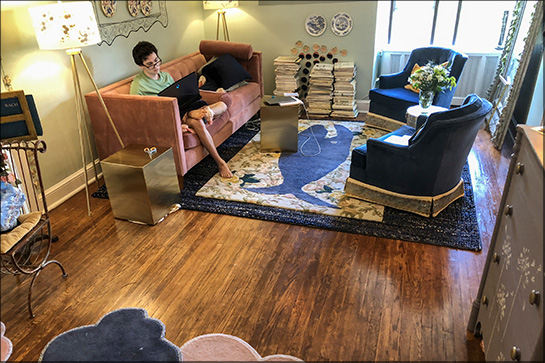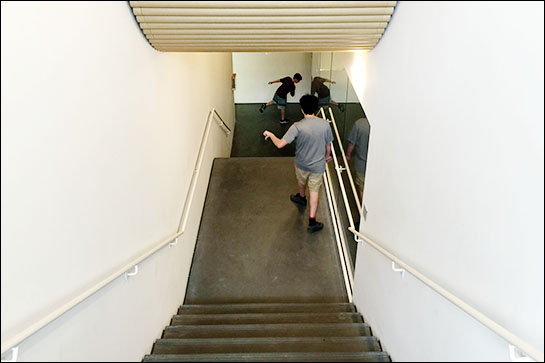Get high test scores without prioritizing tests

It’s impossible to control the hopes and dreams we have for our kids. They start forming even before the sperm hits the egg. It’s an unconscious human thing that we do.
I didn’t want a kid who loves school, so it sucked that his favorite part of school is tests. I am always hunting links to send to him – headlines that argue my point for me so I can continue my charade of a parent who doesn’t push my own agenda.
Here’s one: Government policies push schools to prioritize creating better test-takers over better people.
At first blush the link seems like a keeper — maybe to send as a treat for a birthday or Hanukkah. But once I thought twice I realized I hate this line of thinking as well. I hate everyone writing about school because why are they even doing research? We don’t even have an agreed upon goal for school yet the public funds research about the efficacy of school.
So here’s this SUNY Buffalo announcement that shockingly schools measure test scores and not goodness. How could a school ever measure a person’s goodness? And if we have the goal for school of increasing a student’s goodness, then how do we know if there is improvement from the baseline?
Is there some sort of agreement on what makes a good person? We’d need that before we could know what defines making someone a better person. Better than good, I guess. This would be a great time to rescue the word gooder before it’s in the language arts trash bin for eternity.
School could work on making us gooder. Are we going to tell kids they are not born good? Because that’s some hard-core Christianity there. Jews believe we are born good. So we are going to have to stick with gooder if we are keeping church and state separate.
A lot of the article focuses on how much time it takes students to prepare for tests in a test-focused environment.
What I noticed, though, is that it’s actually the tests to prepare for the tests that matter that waste all the time. My son only studied for AP tests. Because as a homeschooler other scores didn’t matter. And I’m sure that’s true in the case of the kids suffering in this SUNY Buffalo study: Most tests don’t matter. The AP tests matter because for lack of anything better colleges count them. Colleges never find out about the classes you took leading up to the AP tests. They just assume you took them.
You could spend all that time being a good person. And, if you were not in school you could spend that time deciding what your own definition of a good person is. The point is that we are all in agreement — SUNY Buffalo, college admissions and homeschoolers — that kids should spend the least time possible studying for the tests that colleges requires. Which means you should take the fewest amount of tests you need to get into college. You’d be shocked how few that really is.



I don’t think this is going to be a popular comment because most people hate tests. But I think the skill that school tests assess is how good you are at understanding questions and what’s being asked. It’s a communication assessment.
Being good at understanding what you’re being asked, and being able to figure out how to answer it in a way the other person will understand and accept, is a really good skill to learn. Most people are really bad at that. When you’re good at it, other people enjoy communicating with you.
That’s why I loved tests as a kid. I bet that’s at least part of why your kid loves them, too.
Hm. I don’t know about this. Because the people who like tests most are those with autism. Girls love the tests you can prepare for and boys love the tests you can’t prepare for. But in general, it’s the autistic kids who love tests. So this makes me think that there’s no way it could be testing for communication skills. I think, actually, it’s rewarding kids who like to look for right answers. And most conversations don’t have right answers. Most things in life don’t have right answers, but most people with autism spend their time looking for right answers.
Penelope
I usually find the “girls do this, boys do that” stuff to be pretty nonsensical. Of course you probably know that most of the differences between boys and girls are a matter of overlapping bell curves, so it’s probably silly to point that out. But it might be worthwhile pointing out that gender stereotypes tend to work less accurately for people who are autistic or in the broad autistic phenotype. So if you’re in a family like that, pretty much everything someone says about “boys do this, girls do that” just seems stupid. It’s relevant in part of the bell curve only.
I do wonder about the sex distribution of test anxiety, though. It seems to me that it may affect girls more, because I hear about it more from girls (yeah, I talk to a lot of kids – my daughter is very social). I’ve read some studies that suggest this is widespread, and persists – indeed worsens – into college.
Test anxiety is a significant factor in test outcomes; in this way, teaching children to reduce their test anxiety may not only be a large factor in improving test outcomes, but may have different impact on boys vs girls. The current public school paradigm, which includes spending significant class time on test preparation, as well as repeated stressing of how important broad standardized tests are, may thus do more to depress girls’ scores than boys. Conversely, in private schools, where broad standardized tests are deemphasized, where zero classroom time may be spent on preparation, and where preparation includes making sure the kids don’t have homework the night before and telling kids the tests aren’t very important, may improve girls’ scores more than boys’.
Given that private schools don’t share their test results, I expect that research on that question (do girls do relatively better on standardized tests than boys in private vs. public schools) is difficult. I’d be interested to read it, though. My guess is that girls do worse on standardized tests in environments where a bigger deal is made of tests, because of increased anxiety, and that doesn’t affect boys as much.
Sex stereotypes are very strong with autism, it’s just different stereotypes. But sex differences are so strongly reinforced in autism that we need two different tests. Male tests do not work for females.
Penelope
It’s interesting to me how much less time private schools spend on test prep than do public schools. At some, the answer is almost none. ERBs are next week for the private schools, and my daughter’s class is spending approximately zero time preparing for them. This week, they’re working on big projects, giving oral presentations, the usual.
The advice given for parents? Make sure their ipads are charged up, and they get a good night’s sleep.
This is because nobody is going to judge the schools, or the teachers, based on those scores. Conversely, if a public school collectively bombs the MCAS, there is hell to pay. So the principals ride the teachers, and the teachers ride the students. And the students who would already have done great on the tests miss an entire month of instruction.
Most tests don’t matter. Not for the kid, anyway. For the school, tests can matter all too much. They can result in a principal getting fired, a superintendent getting fired, the state taking over a school system…
What I’ve learned over my lifetime is education is far from being limited to any schooling at any level. Also, it’s a pursuit that is a marathon rather than a sprint. And education viewed from a marathon perspective will result in more knowledge exposure and retention. As I see it now, high school and college were only the preliminary stages of my education. Those education settings were helpful in exposing me to different ways of thinking. It wasn’t only the teachers or the curricula. Just as important were the personal interactions and relationships developed with the teachers and other students. And as I mentioned, it was only the beginning. So, in summary, I think what’s important is the thirst for knowledge and being aware of where you are in your journey. For myself (and I think it’s true for most people), the more I learn, the more I realize I don’t know. It’s like trying to keep my head above water sometimes.
I can understand why goodness would be a theme in this post. Kindness has always been at the top of your list. It’s a good virtue to place emphasis on. Is the pursuit of excellence in academics and in a person’s character a good mix in the same setting? I mean, as you allude, are we handing out grades for a person’s goodness? A school setting has its limitations. We should know them and act accordingly. One more thing before I sign off. A college or university has a crop of applicants to choose from each year. It makes its selection and a certain percentage goes on to graduate. The graduates go on to accomplish various things. The college or university then points to the success of their alumni and claims credit. Really. It’s not as if they didn’t contribute but the graduate’s success mostly lies with their efforts and their character was largely developed outside the time spent outside the higher education institution.
On that last point — about the college taking credit for alumni. Really what colleges are good at are picking the applicants who will make the college look good later.
Similarly, my brother and I marvel over our parents’ ability to take credit for our achievements. We always feel we survived in spite of them. And sometimes I feel that the same is true of school — that schools and parents should zipit when it comes to taking credit.
Penelope